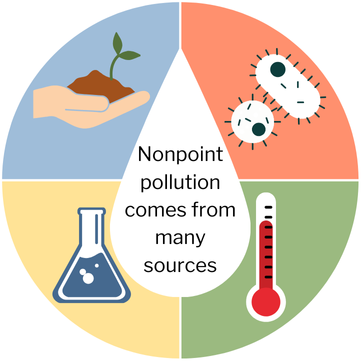Plan to control nonpoint sources of pollution
Provide feedback on Clean Water Guidance chapters
We invite you to comment on the draft Voluntary Clean Water Guidance for Agriculture chapters. This is a technical resource for agricultural producers that recommends site-specific best management practices (BMPs) to protect water quality.
We are posting draft chapters and accepting comments as they become available. Comments can be submitted until 11:59 p.m. on Nov. 21, 2025.
Addressing nonpoint pollution remains a key issue across the state. While Ecology leads efforts to restore and protect water quality, it takes everyone working together to clean up our rivers, lakes, streams, and estuaries.
We provide the foundation of the statewide strategies to address nonpoint sources of pollution through Washington’s Water Quality Management Plan to Control Nonpoint Sources of Pollution (Nonpoint Plan) and the Voluntary Clean Water Guidance for Agriculture (Clean Water Guidance).

It takes us all
Nonpoint pollution refers to pollution that doesn't come from a single source. Instead it, comes from many sources and conditions. It occurs when rainwater or snowmelt picks up pollution as it flows over land and carries it into waterways. Nonpoint pollution can also happen when there is a lack of shade-providing trees next to streams and water temperature increases.
Coming from many different places, this type of pollution can be difficult to manage and is often harder to control compared to pollution that comes from a single source. Our Nonpoint staff work with landowners and local partners across the state to reduce nonpoint pollution from agricultural, forestry, and residential sources.
Our collective plan to address nonpoint pollution
The Washington’s Water Pollution Control Act gives Ecology authority to regulate active and potential sources of nonpoint pollution, however achieving clean and cool water takes us all.
Together, Nonpoint Plan and Clean Water Guidance outline our collective strategies and site-specific recommendations to ensure cool and clean water for all.
Washington's Nonpoint Plan
The Nonpoint Plan outlines our approach to addressing water quality impacts from nonpoint sources. The Plan is required by the Clean Water Act and ensures funding that allows us and our partners to help implement clean water solutions on the ground. While Ecology is responsible for Washington's Nonpoint Plan, it encompasses statewide efforts and partnerships.
2025 Nonpoint Plan
To ensure the Nonpoint Plan accurately reflects our statewide efforts, we strive to update the plan regularly in coordination with state and local partners involved in this work. We are in the process of updating the plan and will submit the next update to the U.S. Environmental Protection Agency (EPA) by the end of 2025.
Public involvement
We held a 100-day public comment period from May 22 to Aug 29, 2025. Comments recieved can be viewed online. Also we held a public informational webinar on June 11 to share about the plan and updates. Read the comment period blog for more information about our process.
Draft materials
- Plan to Control Nonpoint Sources of Pollution
- Reading guide - This is an overview of the plan and highlights recent updates
Finalizing the Plan
Following the the close of the public comment period, we will prepare a response to comments and describe any changes we made to the draft plan. We will submit the 2025 Nonpoint Plan update to EPA by Dec. 31, 2025.

Clean Water Guidance
We are developing the Voluntary Clean Water Guidance for Agriculture alongside the current Nonpoint Plan update. This guidance document is a technical resource for agricultural producers that recommends site-specific best management practices (BMPs) to protect water quality. It is intended to support healthy farms while helping producers meet clean water standards.
Chapters are developed using best available science and through a collaborative process design in coordination with our advisory group. Read our focus sheet to learn more.
Provide feedback on the Clean Water Guidance
We are currently developing the remaining eight chapters to be submitted alongside the 2025 Nonpoint Plan. To provide as much time for review as possible, we continue to post the draft chapters online as they are ready. We encourage everyone to begin their review as soon as possible given the volume of material. You can provide comments on the chapters at any time between now and Nov. 21, 2025. The remaining two chapters on Pesticide management and Suites of practices will be available by the week of Oct. 20
Review draft material:
- Runoff Control for Agricultural Facilities
- Sediment Control: Soil Stabilization & Sediment Capture (Vegetative)
- Water Management: Irrigation Systems & Management
- Nutrient Management
- Subsurface Drainage Management
- Crop Systems
How to comment
- Submit comments online
- Submit comments by mail to:
Ron Cummings
WA State Department of Ecology, Water Quality Program
P.O. Box 47696
Olympia, WA 98504-7696
Finalizing chapters
After the comment period, we review all comments, make necessary changes, and will provide a response to comments when we submit the final chapters to EPA.
Keeping the guidance up-to-date
To ensure the guidance uses the best current science, we anticipate updating chapters as needed in the future.
Related links
- Learn more about water quality funding
- Focus on: Voluntary Clean Water Guidance for Agriculture - learn more about the purpose, development process, and recommendations included.
Contact information
Ben Rau
Watershed Planning Unit Supervisor
nonpoint@ecy.wa.gov
360-742-6529

